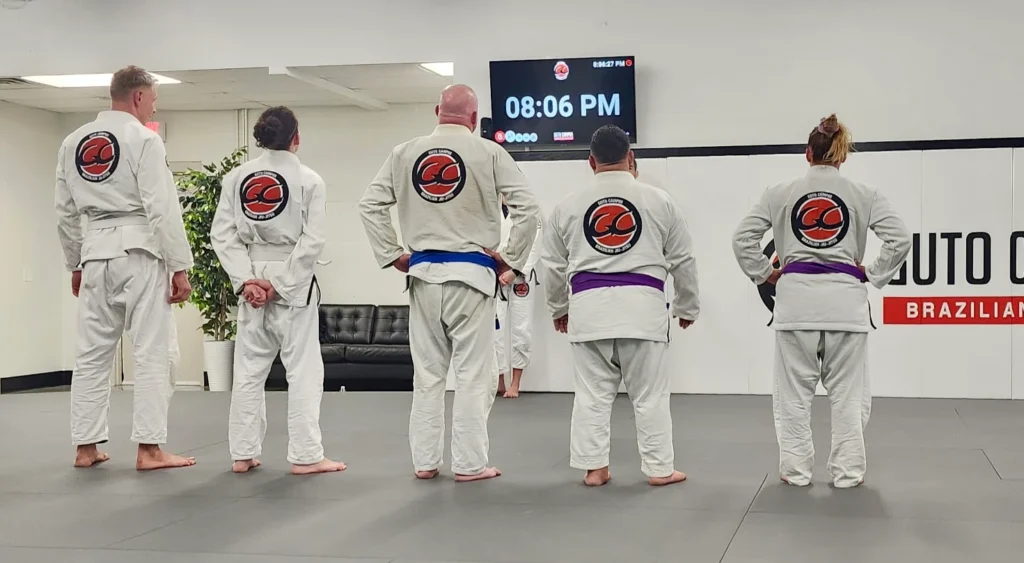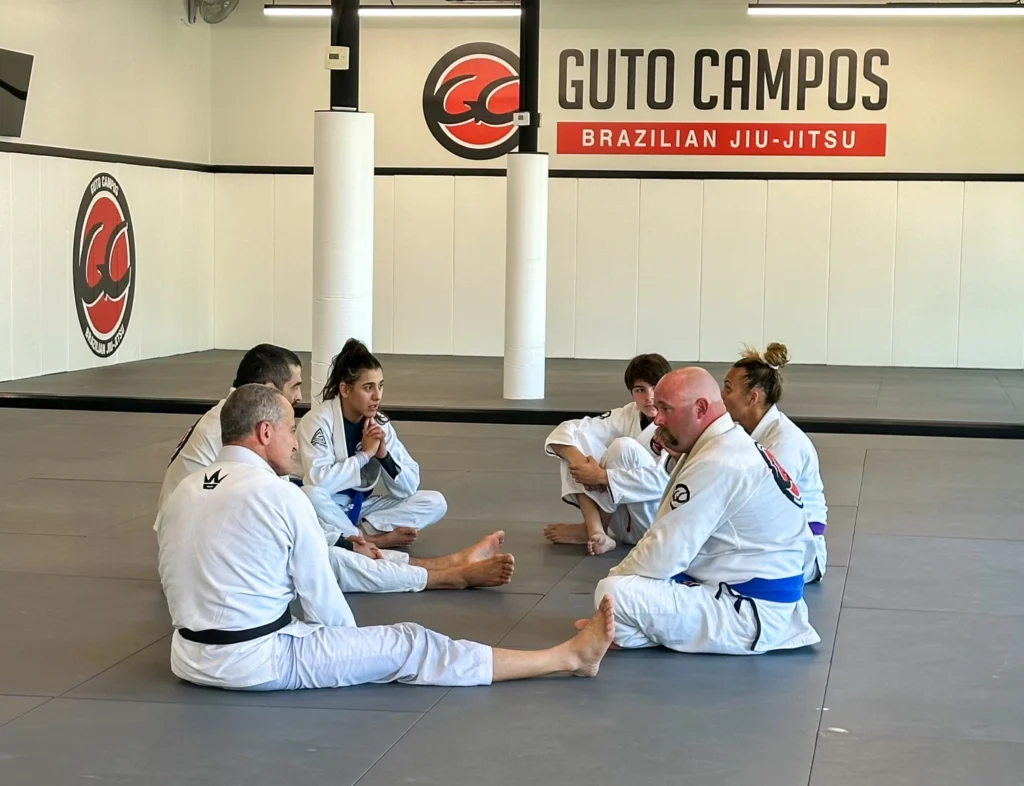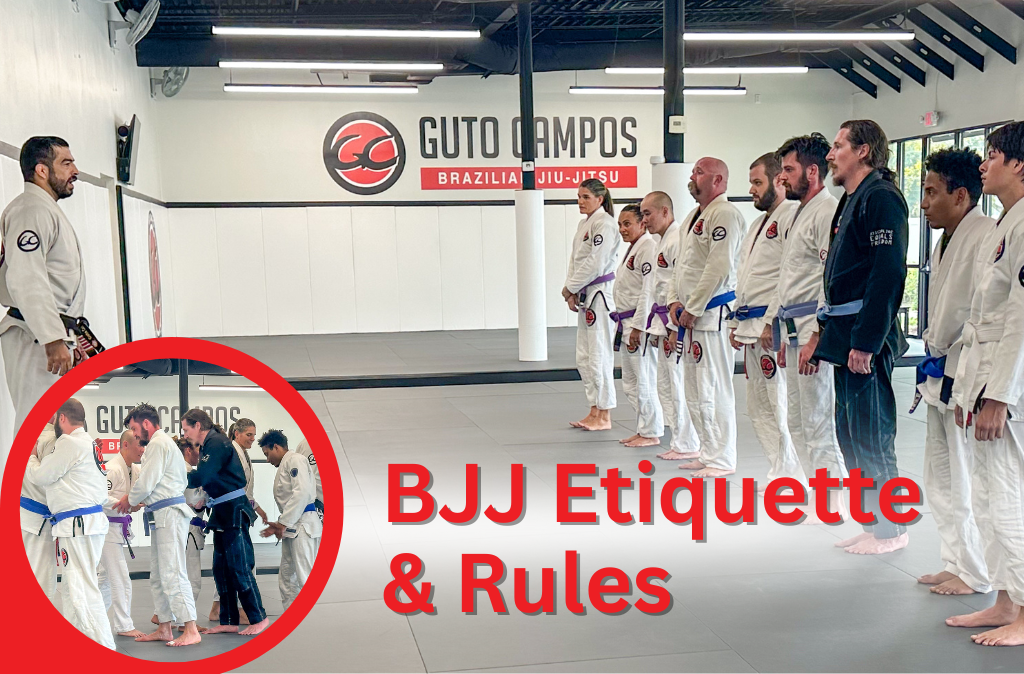BJJ Etiquette & Rules: 9 Bad Habits That Slow Your BJJ Progress
If you’re serious about progressing in Brazilian Jiu Jitsu, your mindset and conduct on the mat matter just as much as your technique. You could be drilling armbars with full focus, but if you’re ignoring key etiquette, you could be slowing down your own progress.
Across the world, BJJ gyms follow many of the same unspoken rules — not just out of tradition but because they keep training safe, respectful, and growth-driven. These aren’t arbitrary rules. BJJ has a global culture built on respect, awareness, and discipline. And those values show up in the details: how you show up, how you roll, how you treat others.
Yet, these expectations aren’t always spelled out, and even experienced practitioners slip up.
This isn’t about being a “perfect student.” It’s about becoming someone coaches trust, teammates respect, and everyone wants to train with: someone who actually improves.
So if your progress feels stuck, the issue might not be your technique but your habits. Let’s break down 9 common BJJ etiquette mistakes that can hold people back and how to fix them before they become your norm.
KEY TAKEAWAYS
- Respecting BJJ etiquette is just as important as learning techniques if you want to progress.
- Training with ego, ignoring hygiene, or rolling too hard with partners can slow down your growth.
- Consistently focusing during drills and showing up with a learning mindset accelerates improvement.
- Staying safe means listening to your body, resting when needed, and keeping teammates healthy too.
- Building trust, respecting rank, and connecting with teammates helps create a strong, supportive mat culture.
Mistake #1: You are letting ego lead the roll.
The Biggest Bad Habit: It is harmful in the long run when you are treating every roll like a tournament match, going 100% all the time, trying to “win” at training, or refusing to tap because you think it makes you look weak.
Rolling with ego kills your ability to learn. Instead of exploring positions, you default to your comfort zone. Worse, you become the partner people avoid because constantly trying to prove yourself goes against the spirit of BJJ etiquette and creates a toxic training vibe.
Instead, drop the “win-at-all-costs” mindset. Rolls are where you experiment, mess up, and learn. Get comfortable being tapped often. That’s not losing; that’s how you level up. Remember, you’re on the mat to improve your Jiu Jitsu, not to try to prove you are better.
Mistake #2: You are ignoring personal hygiene and cleanliness.
Showing up with poor hygiene, like a dirty gi or rashguard, long nails, bad breath, skipping showers, or never washing your belt because of a myth is doing more harm than good.
Poor hygiene isn’t just gross; it puts your teammates at risk for skin infections, creates discomfort, and makes people quietly avoid training with you. If no one wants to roll with you, your mat time and progress suffer.
And don’t forget your feet: wear flip-flops when off the mat, especially if you step into the changing room or bathroom. Walking barefoot into shared spaces and returning to the mat spreads germs fast.
Fix it: Wash your gi or no-gi gear after every class (yes, every class). Trim your fingernails and toenails. Keep your hair tied back. Wash your belt, because it collects bacteria too. Bring flip-flops and wear them anytime you leave the mat. Cleanliness is a core part of Brazilian Jiu Jitsu etiquette, and respecting your teammates starts with respecting your own hygiene.
Mistake #3: You are disregarding the belt hierarchy.

It might not seem like a big deal, but small things like accidentally lining up out of order, crowding a higher belt during rolls, or interrupting during instruction time can come across as a lack of respect. In Brazilian Jiu Jitsu, rank isn’t just a color; it reflects time, experience, and the lessons someone has learned along the way.
Why This Matters: BJJ isn’t just about individual skill; it’s about learning from those ahead of you and respecting the structure that supports everyone’s growth. When you overlook rank, even unintentionally, you might miss out on mentorship opportunities and the trust that comes with showing respect.
The proper course of action is to line up in rank order at the start and end of class. Let higher belts take the lead during drills. If space is tight, adjust your position to give them room. These actions may seem small, but they reflect a deeper understanding of the art, and teammates and coaches always notice.
You May Also Like: 5 Life Lessons You’ll Learn from Brazilian Jiu-Jitsu
Mistake #4: You are treating drilling time like a break.
After the instructor demonstrates a technique, that’s your chance to internalize it; not to slack off, half-drill, or coast through the reps while chatting. When you treat drilling like a break instead of focused training, you miss the chance to truly improve, and you shortchange your partner’s progress too.
This kind of behavior can be frustrating to your training partners, especially when they’re trying to learn. Respecting your partner means being present, giving them quality reps, and using the time intentionally.
Make every rep count. Drill with focus, help your partner troubleshoot, and use the time to practice to strive for improvement. Consistency here is what separates the speed of growth from one practitioner to the next.
Mistake #5: You are rolling too hard with new or smaller partners.
The Bad Move: Using brute strength, cranking submissions, or going full intensity against beginners or lighter teammates, as if you’re in a fight, not a training session. It’s a classic violation of Jiu Jitsu etiquette and one that can quickly damage trust on the mats.
Going too hard doesn’t make you better; it just makes you unsafe. You won’t develop timing, technique, or control, and you’ll quickly become the person people avoid rolling with. If no one wants to train with you, your progress stalls.
Always gauge your intensity to match your partner’s. If they’re smaller, newer, or clearly less experienced, roll with finesse, not force. Focus on clean movement and technical precision. Want to go hard? Save it for open mats with someone your size who agrees to it. Good training partners help each other grow, not just survive.
Mistake #6: You are training while sick or injured.
Showing up with a cold, a skin rash you haven’t identified, or an injury you’re trying to “train through” because you don’t want to miss a day isn’t something to be proud of.
The Hidden Cost of This Habit: Training sick spreads illness. Training injured delays your recovery and endangers your training partners. In both cases, you’re not displaying commitment; you’re violating basic BJJ etiquette. Instead of being seen as dedicated, you’ll be seen as careless.
If you’re contagious, stay home. If something feels off, especially skin issues, don’t “wait and see.” Get it checked. And if you’re injured, focus on healing. BJJ will still be here when you return, and your teammates will thank you for keeping the mat safe.
Mistake #7: You’re constantly thinking about promotions.
Where It Goes Wrong: If you find yourself comparing your progress to others, asking when your next stripe or belt is coming, or feeling frustrated about not being promoted, it’s easy to lose sight of what really matters: consistent growth, not status.
Focusing too much on rank can shift your mindset from learning to chasing validation. It may create unnecessary pressure, frustration, or even competition with teammates, all of which can quietly derail your enjoyment and progress.
It’s important to trust the process. Coaches see your effort, even when progress feels invisible. Show up, improve your technique, support your teammates, and focus on becoming better than you were yesterday. Belts and Stripes are not goals; they’re milestones that reflect the journey you’re already on.
Mistake #8: You’re skipping the small stuff that actually matters.
Whether it’s showing up late, skipping warm-ups, or going through drills without full focus, brushing off these details sends a clear message: that you’re not fully committed to the process.
Why It Affects Your Progress: These habits don’t just disrupt your own growth; they affect your training partners and the flow of class. Warm-ups prepare your body and prevent injury. Drilling builds timing and precision, and showing up late means missing instruction and interrupting the class dynamic.
Progress in BJJ doesn’t come from big moments; it’s the result of small, consistent choices done with intention. Be on time. Stay engaged. Use every part of class to improve. These habits may seem small, but they separate serious students from casual ones, and coaches always notice the difference.
Mistake #9: You’re missing opportunities to connect off the mat.

BJJ is built on community. Your teammates are the ones helping you improve, keeping you accountable, and making training feel like more than just exercise. When you consistently stay distant, whether that means skipping team events, or never engaging in a quick conversation with teammates and coaches, you miss out on one of the most powerful drivers of progress: connection.
That doesn’t mean you need to hang around after every class. Life is busy. Work, school, family; those responsibilities matter. But when you do have a chance to connect, even briefly, take it. Say hello when you walk in. Stick around when you can to support a teammate or share a laugh. These small moments help build trust, strengthen training partnerships, and make your journey more fulfilling.
You don’t have to be the most social person in the room, but showing up for your team, even in small ways, creates a stronger mat culture and makes you someone others want to grow alongside.
Progress isn’t just about the techniques you learn; it’s about how you train.
In Brazilian Jiu Jitsu, it’s easy to obsess over submissions, sweeps, and when your next stripe is coming. But the truth is, many people stall their progress not because of a lack of skill but because they overlook the fundamentals of Brazilian Jiu Jitsu etiquette and develop habits that quietly hold them back.
Every roll, every class, every training partner is an opportunity if you show up the right way. That means respecting the space, the people, and the process. Avoiding these 9 bad habits isn’t about following rules for the sake of it; it’s about training smarter, safer, and with the kind of presence that earns trust, builds community, and accelerates real growth.
At Guto Campos BJJ in Orlando, we don’t just teach techniques; we build champions through culture, discipline, and community. Whether you’re brand new to BJJ or looking to deepen your game, you’ll find a welcoming space with world-class coaching and teammates who push you to improve. Start your journey with our 7-day free trial and train with us here in Orlando.

